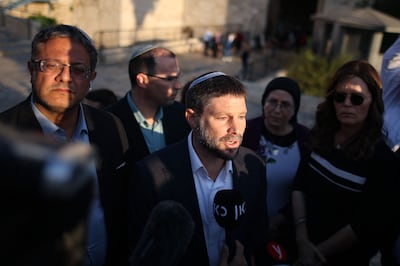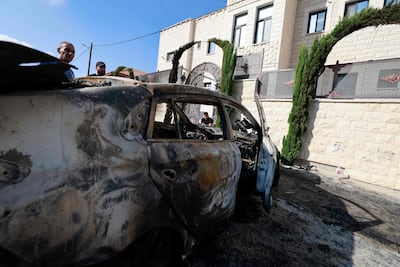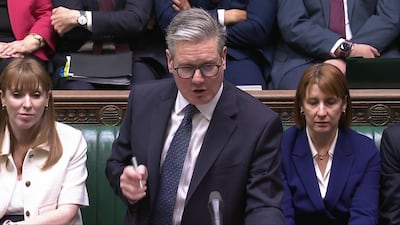The likelihood of two hard-right Israeli government ministers being sanctioned by Britain moved forward on Wednesday after the UK Prime Minister announced that action was being considered after fresh incendiary comments from the pair.
Momentum is growing behind the idea of placing tough restrictions on National Security Minister Itamar Ben-Gvir and Finance Minister Bezalel Smotrich after they were labelled “extremist” towards Palestinians by senior UK government figures.
In an impassioned question in parliament, Lib Dem leader Ed Davey recalled Mr Smotrich's statement that starving two million people in Gaza “might be justified and moral”, and Mr Ben Gvir's that illegal settlers who killed a teenage Palestinian were “heroes”. He called on Prime Minister Keir Starmer to sanction the pair.

“We are looking at that because these are obviously abhorrent comments,” Mr Starmer responded. He also raised the “really concerning activity” of illegal settlers in the occupied West Bank, widely championed by Israel's far-right, and the “dire humanitarian situation in Gaza”. Britain, along with France, has called for an urgent meeting of the UN Security Council to address the Israel-Gaza conflict, he confirmed.
Extremist pressure
Britain’s relationship with Israel has changed since Labour came to power, with a partial arms export ban imposed, UNRWA Gaza refugee funding reinstated and the withdrawal of opposition to the International Criminal Court’s arrest warrant for Prime Minister Benjamin Netanyahu. Relations could substantially deteriorate if the two senior Israeli ministers are sanctioned.
Pressure for that is now growing after they were labelled “extremists” in parliament on Tuesday, with former Prime Minister David Cameron also disclosing that he had considered sanctioning them during his last days as foreign secretary.

At a press briefing following Prime Minister’s Questions, Mr Starmer's spokesman hinted that the matter was actively being examined but said “we don’t provide more detail on sanctions under review”.
“As the PM said we will be looking into going further when appropriate,” he added. Asked by The National what the nature of the restrictions might be, the spokesman said: “We can’t get ahead of future sanctions, and it will depend on any policy introduced. We will continue to look at future measures as appropriate.”
Thirty-day threat
Further pressure has been placed on the Israeli government to address the deteriorating humanitarian crisis in Gaza, where 42,000 Palestinians have been killed in the last year, after the US said it would withhold military aid if the situation did not improve in the next 30 days. Asked if he concurred with Washington’s stance, Mr Starmer stated: “I do agree with those remarks”.
“There is an urgent need, and has been now for a very long time, for more aid to get into Gaza,” he added. “It's a desperate situation, but Israel must comply with its international humanitarian law obligations.”
IRGC sanctions review
With the continued backing of Iran’s Islamic Revolutionary Guard Corps (IRGC) for Hezbollah and participation in extremist activities, pressure has also grown on the Labour government to proscribe the IRGC as “terrorists”. When he was in opposition, the current Foreign Secretary David Lammy and other senior Labour politicians called for the government to outlaw the IRGC.
But since entering government they have dodged the issue, with Foreign Office sources stating that proscribing the IRGC would lead to a significant diplomatic breach with Iran. Asked by The National why the group had still not been proscribed, the PM's spokesman said the government did not comment on specific organisations but that the list of proscribed groups was “under constant review”.
“We have 400 sanctions against Iranian individuals and organisations including members of the IRGC and we will continue to work at pace to identify Iranian state threats and take action when appropriate,” he added.


